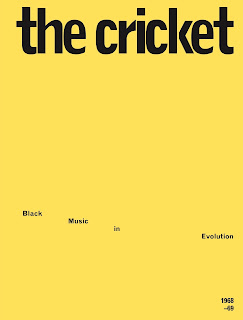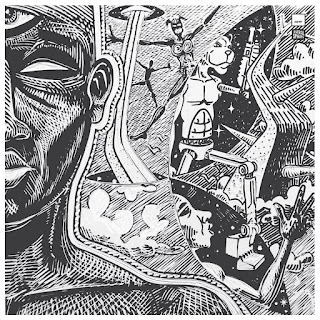The Cricket: Black Music in Evolution 1968–69
(Blank Forms, 2022)
The title of this review is taken from both the subtitle on The Cricket: Black Music in Evolution 1968–69 and the final track, “Revolution Should Be Love Inspired,” on Konjur Collective’s debut album Blood In My Eye (A Soul Insurgent Guide). In a sense, the timeliness of these releases allows for a false construction of a conversation (to some limited extent), where the inevitable question of something like, what happened to the Black avant-garde—as we generally know it now (and as some knew it then)—is answered by one of Baltimore’s heaviest groups (re-)defining what the Black avant-garde represents today.
Now. The Cricket is a gift, and it’s also a searing, eye-opening read that would indict every white, male writer in this blog’s circle, all us well-meaning liberals (per The Cricket) who claim some dominion over the Black music most commonly known as jazz, or free jazz, or improvised music, or free improvisation. And so. Take everything here with a grain of salt or two, if needed, but we all know white jazz critics (myself inc.) love dead Black musicians; canonizing is easier done than exploring the vitality of any US city’s lively jazz (and -adjacent) scenes. It’s easier to wax poetic than champion Raw Poetic, or put another way, from a safe distance, a reissue is worth more than something freshly pressed. The writers, critics, scholars, and artists contributing to The Cricket saw this reality in 1968 and 1969, and the broadsheet’s essays describe the frustrations of Black creative artists. One issue features Milford Graves, one of The Cricket’s advisors, along with Sun Ra and Cecil Taylor (beloved, see above), writing about the exploitation of Black artists: “Because we have lacked a strong economic program for Black Artist in the past, the Black Artist has strongly depended on the white western oppressive system for economic help… We are the creators of Rhythm & Blues, Jazz, and The New Black Revolutionary Music, we are the raw material that the white oppressor has used to strengthen his survival and weaken ours.” Another beautifully potent essay cuts drummer Shelly Manne down for misunderstanding Ornette Coleman’s The Empty Foxhole and for the harsh, cruel words Manne published against Denardo Coleman, then 10 years old, in Downbeat Magazine. Larry Neal writes, “We make or create time instead of keeping time like a metronome. ‘To keep’ time is a Western concept which almost means boxing in time. If you want that kind of ‘order’ then keep right on listening to drummers like Shelly Manne. But if you want a more expanded universe, a multi-sided, concept of time check out drummers like Milford Graves, Rashid Ali, Beaver Harris, and a whole lot of good young men.” Denardo Coleman is, of course, included in that list, and certainly many readers of this blog will nod along and side with Neal when they read this. The names that Neal presents, and hints of more to come, has borne itself out as free-jazz drumming has shown itself to be one of the most fluid and dynamic modes. Graves, Ali, Harris, Coleman, and the many others liberated jazz from its kept state by making new kinds of time, their artistry and ingenuity laying a groundwork that continues to shift underfoot.
And then. Enter “George Jackson” in a slow fade to the center. Show Azar’s trippy synth pushes to the fore, then Jamal Moore cuts in with an alto solo, and Bashi Rose’s drums make that sweet time. It’s a heady brew, luminous and addictive, with Moore playing an Ornette-equse sing-song melody throughout. This is the 20+ minute opener to Konjur Collective’s incredible debut double-album, Blood In My Eye (A Soul Insurgent Guide), put out by cow: Music, a Black-owned subsidiary of Astral Spirits. Connections are all there, the title reflects Jackson’s final book, which is both a meditation on revolution and a call to rise up—with arms, if necessary, but not necessarily. It’s a distinction that’s often written out of Jackson’s history (because, of course), and in any dismissal of Jackson’s deep and detailed writings there is something of Manne’s crude dismissal of the Colemans. Musically, there are links to Archie Shepp’s “Blues for Brother George Jackson” from Attica Blues and Art Ensemble of Chicago’s “A Jackson In Your House,” released when he’d been in prison for nearly a decade. Azar, Moore, and Rose fold all of these things together into their funk- and punk-infused album, which (from a certain metaphorical perspective) plays like a collection of aural essays, with discussions of revolution, incarceration, rebirth, and spaceways. Jackson recurs in a mid-album funk workout dedicated to his brother, “Jonathan Jackson,” and on the glorious closer, quoting from his posthumous tome, “Revolution Should Be Love Inspired.” Throughout, Azar’s synths are pitched to fuzzed-out tones, capturing subspace transmissions that disrupt the moodily pleasant atmosphere. Moore switches from alto to trombone on some tracks, comfortably moving between the two, even while sax feels like a comfortable home base. On “Wade In the Water,” Moore’s alto sings, less a preacher’s call than a disciple’s wail; something of a “why hast thou forsaken me?” question for any supreme being within hearing range, or for the (again, mostly white) jazz cognoscenti who stopped paying attention to the Black underground.
So. The revolution may not have been televised as it should have, but the writing in The Cricket and the music on Blood In My Eye show that it can be (and often is), as Jackson wrote and Konjur Collective quotes, love inspired. Both these works demonstrate revolution of the mind, revolution in the arts, and a revolution of the spirit, all of which lead to a (re-)vitalization of the music. Revolutionaries also must find a way to recognize how, at all moments, we are bound to history, even as these artists seek to break free from that historical gravity and claim their moment. Konjur Collective has certainly solved this riddle. Keep paying attention, now.
Buy direct from Blank Forms
Buy direct from cow: Music














1 comments:
Very nice and detailed review Lee.One that manages to give a lot of answers to the questions posed by this vital edition by the ever great Blank Forms. Btw, for those of us who do not reside in the States, there are European retailers that sell it.
Post a Comment